Water is a fundamental element for sustaining life and regulating body temperature. Individuals focused on weight loss often wonder, “Does Water Have Calories?” This article will provide a clear and factual response to these inquiries.
1. What Are Calories?
The energy our bodies gain from the breakdown of food is quantified in a unit known as a calorie.
Note: It’s useful to understand that not all calories are the same in terms of nutritional value. For instance, calories from nutrient-rich foods support better health compared to those from foods with little nutritional value.
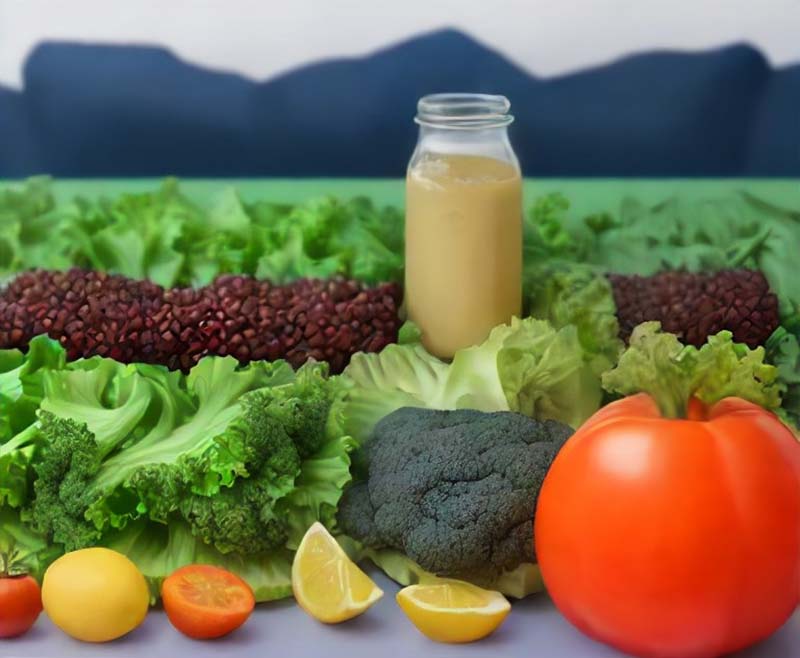
2. The Role of Calories in Our Body
Calories are vital in powering the numerous metabolic processes in our bodies, essential for life. They provide the energy that keeps our cells functioning, our heart and lungs operating, and our organs performing their necessary roles. This energy is derived from the foods and beverages we consume.
Maintaining a balance in calorie intake is key to a healthy lifestyle. Consuming just the right number of calories needed daily can promote overall well-being. However, an imbalance, whether it’s consuming too few or too many calories, can lead to various health issues over time.
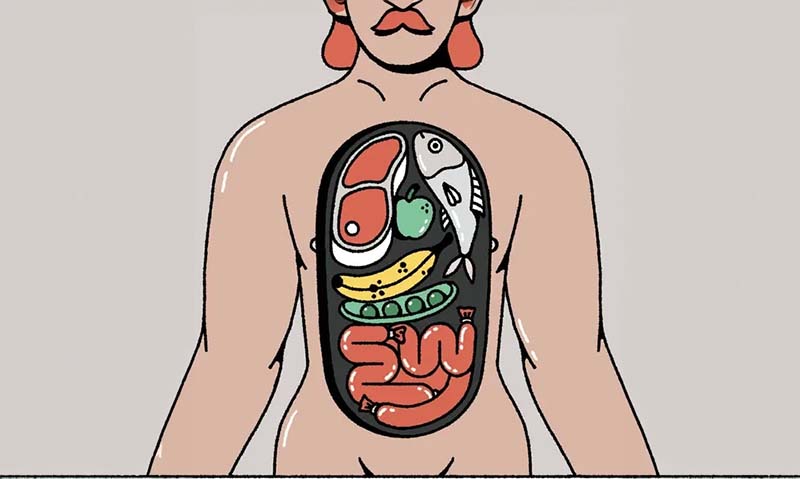
3. Calorie Content of Water
Water is entirely calorie-free, containing 0g protein, 0g carbs, and 0g fat. It’s an excellent source of hydration and, depending on its source and whether it’s filtered or distilled, may contain minerals like calcium, fluoride, iron, potassium, and sodium. Some flavored or enhanced waters include added electrolytes or vitamins. The only scenario where water has calories is if it has calorie-containing additives.
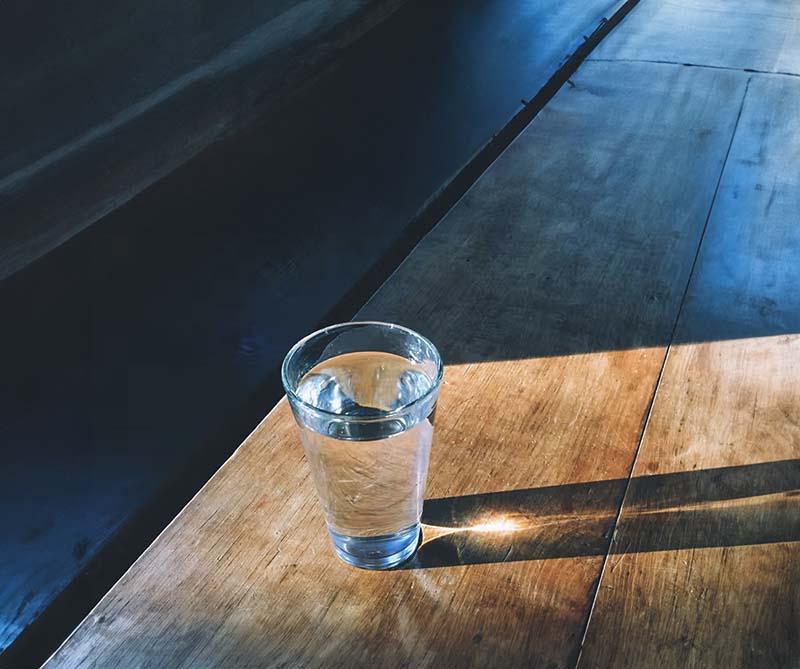
3.1 Tap Water or Bottled Water
The idea that drinking cold water boosts calorie burn, as the body warms the water to body temperature, is partially true but minor, burning only about 8 calories. Both tap and bottled water can be rich in essential minerals like calcium, potassium, magnesium, zinc, iron, copper, and fluoride, which are crucial for bodily functions and disease prevention.
3.2 Some Types of Water May Contain Calories
While pure water has no calories, varieties such as carbonated sweetened water, fruit-flavored water, or protein water do contain varying calorie levels.
Carbonated Water
A 12-ounce (355-ml) serving of carbonated water can have about 124 calories and 32 grams of added sugar, although this can vary by brand.
Fruit-Infused or Fruit-Flavored Water
Fruit-infused waters, which include herbs and fruit slices, and popular lemon water made from fresh lemon juice, typically have minimal calories. For example, the juice from a whole lemon adds just 11 calories.
Protein Water
Gaining popularity for their convenience, protein waters are aligning with growing evidence of protein’s role in weight management, immune health, and healthy aging.
Note: When choosing flavored or enhanced waters, it’s important to check for added sugars and artificial ingredients that can offset the health benefits of staying hydrated.
4. Nutritional Composition of Water
When you measure one cup of water, which is about 8 fluid ounces or 237 grams, you’ll find it has zero calories, no protein, carbohydrates, or fat. This makes water an ideal drink for staying hydrated without adding any extra calories or nutrients to your diet. Water can be a natural source of various minerals, including calcium, fluoride, iron, potassium, and sodium. These nutritional facts come from the reliable USDA database.
- Calories: 0
- Fat: 0g
- Sodium: 9.5mg
- Carbohydrates: 0g
- Fiber: 0g
- Sugars: 0g
- Protein: 0g
Note: The mineral content in water can vary based on its source, like spring or tap water. Mineral-rich water can contribute to your daily mineral intake, but it should not be your sole source of these nutrients.
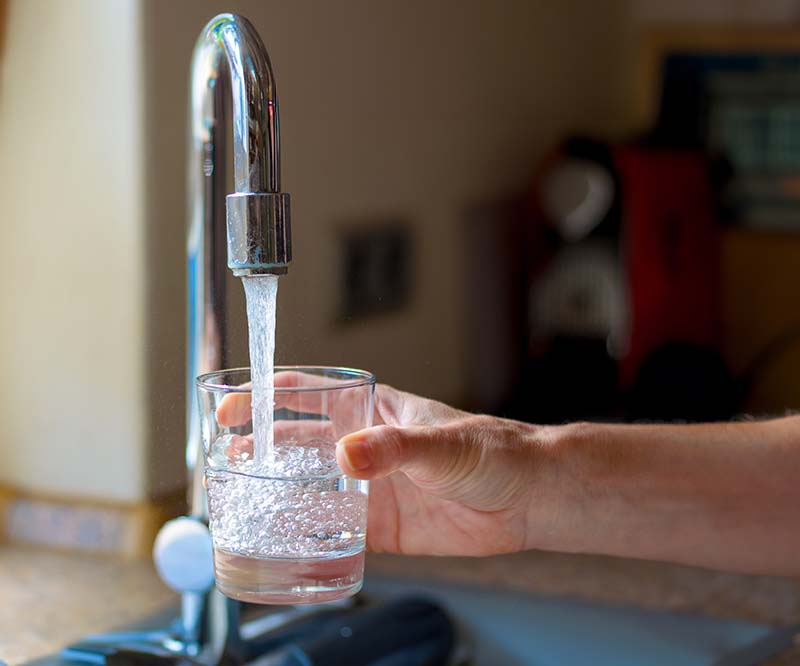
4.1 Carbs, Fat, and Protein in Water
Plain water is completely free of carbohydrates, sugars, fiber, or starches. This remains true unless the water has added flavorings, like juice, which can introduce these elements. Pure water also contains no fat and offers no protein content. It’s the perfect choice for anyone looking to maintain a low-calorie diet or for those who need to avoid sugars and fats for health reasons.
4.2 Vitamins and Minerals in Water
The mineral content in water can vary greatly. Some water sources naturally contain essential minerals such as calcium, fluoride, iron, potassium, or sodium. This can depend on where the water comes from and whether it has been filtered or distilled. Additionally, there are flavored or enhanced water products available that have added vitamins or electrolytes for extra nutritional benefits.
Note: While enhanced or flavored waters can be a good source of extra vitamins or electrolytes, it’s important to check for added sugars or artificial ingredients that might offset the health benefits. Always read the label to make sure you’re getting the healthiest option.
5. Health Benefits of Drinking Water
Water is essential for life, and its benefits are crucial for maintaining good health. Here’s a look at why water is indispensable for our survival.
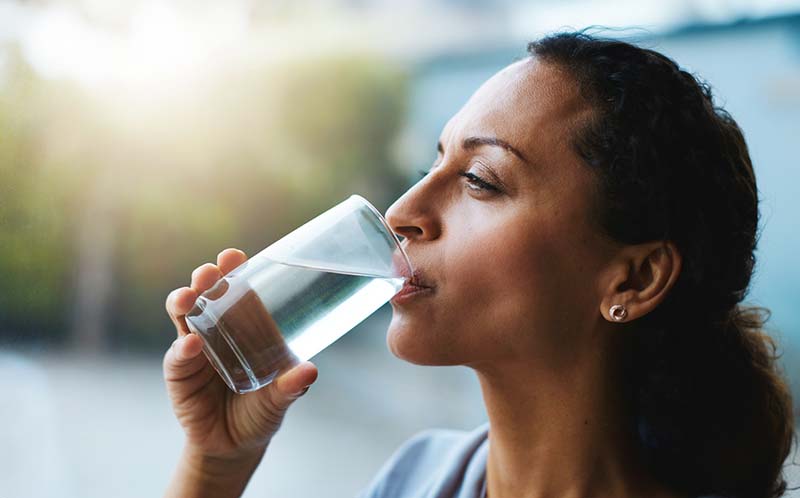
5.1 Prevents Dehydration
Staying hydrated is key to maintaining health. Consuming ample fluids and eating water-rich foods like fruits and vegetables is vital. Thirst shouldn’t always be your only indicator for needing water. It’s important to hydrate regularly, particularly before and during physical activity, to prevent dehydration, which can have serious health implications.
Note: Remember to increase water intake in hot weather or when engaging in physical activity to compensate for increased fluid loss through sweating.
5.2 Regulates Body Temperature
Water plays a critical role in temperature regulation. Stored in the middle layers of the skin, water emerges as sweat when your body heats up. The evaporation of this sweat cools down your body. Insufficient hydration can lead to increased heat storage, making it harder to manage heat stress. Keeping well-hydrated may also lessen physical strain during heat stress or exercise, though more studies are needed in this area.
5.3 Can Improve Mood
Water is essential for mental health. It aids in the production of serotonin, a “feel good” chemical, by providing the brain with enough tryptophan, an amino acid. Increasing water intake can elevate your mood and overall mental health by supporting the continuous production of serotonin.
5.4 Removes Waste
Proper hydration enables your body to efficiently remove waste through sweat, urine, and bowel movements. Organs like the kidneys and liver rely on water to filter and flush out waste. Additionally, water helps prevent constipation by softening stools and facilitating the movement of food through the intestinal tract.
5.5 Improves Digestion
Water is crucial for digestion. It helps break down food, allowing your body to absorb nutrients more effectively. Drinking water during or after meals aids in the digestive process. It also plays a role in preventing constipation by softening the stool.
5.6 Helps Manage Weight
Replacing sweetened juices and sodas with water can aid in weight loss. Drinking water before meals, known as “preloading,” can create a feeling of fullness, helping to prevent overeating and manage weight more effectively.
Note: When attempting weight loss, consider adding water to your dietary regimen as a simple yet effective strategy to aid in reducing calorie intake.
6. Potential Side Effects of Drinking Too Much Water
Drinking excessive amounts of water can lead to a condition called water poisoning or intoxication, which disrupts brain function. This occurs when there’s an overload of water in the body’s cells, including those in the brain, leading them to swell. Swelling of brain cells can increase pressure inside the skull, resulting in symptoms like confusion, drowsiness, and headaches.
Furthermore, overhydration might cause water toxicity. This happens when the volume of water in the body exceeds what the kidneys can remove. As a result, the body’s electrolytes, crucial for many bodily functions, get diluted.
Note: It’s essential to balance your water intake. While staying hydrated is important, too much water can be just as harmful as too little. Listen to your body’s signals and hydrate accordingly, especially during intense physical activity or high temperatures.
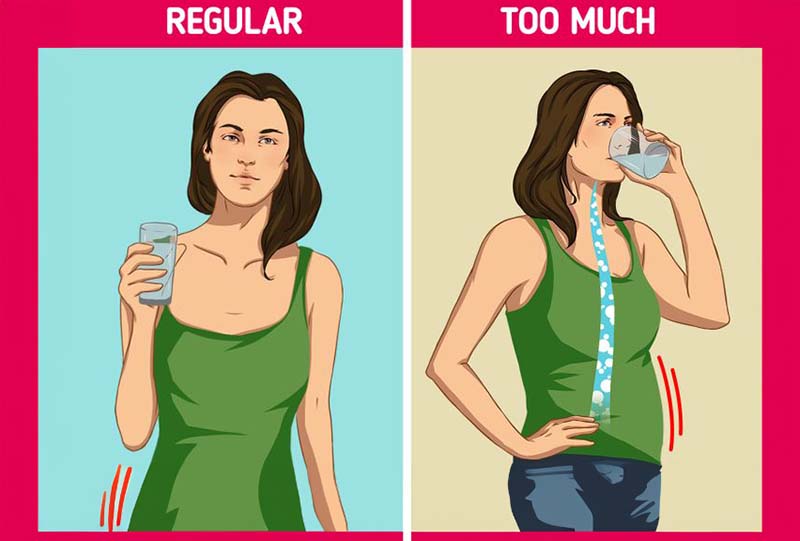
7. How to Prepare and Store Water Safely
7.1 Cleaning Bottles or Containers
For maintaining the quality of stored water, it’s crucial to clean the bottles or canisters properly. Use soap and water for a thorough wash and rinse them well. After cleaning, fill them with water and mix in two capfuls of household bleach for every 10 liters of water. Let this solution sit for at least 30 minutes before rinsing the containers thoroughly.
7.2 Use Cold Water
After cleaning, fill the containers with tap water. Ensure the water is cold before filling, as this indicates its freshness. Avoid using warm water for storage, as it may leach metals from pipes, affecting the water’s quality.
7.3 Store Water Properly
Keep your water in a cool, dark location, away from direct sunlight. Sunlight and heat can degrade plastic containers over time, potentially altering the water’s taste and smell. Also, avoid storing water containers near chemicals like petrol or pesticides, as plastic can absorb these vapors.
7.4 Enhancing Water Flavor
It’s completely fine to make water more enjoyable by enhancing its flavor. For a natural touch, add slices of lemon, lime, strawberries, cucumber, or fresh herbs to your water. In colder weather, warm herbal tea or hot lemon water are comforting options. If you prefer a bit of fizz, sparkling water is a great choice.
Note: Adding natural flavors not only improves the taste but can also provide additional health benefits, like vitamins and antioxidants, depending on the fruits or herbs used.
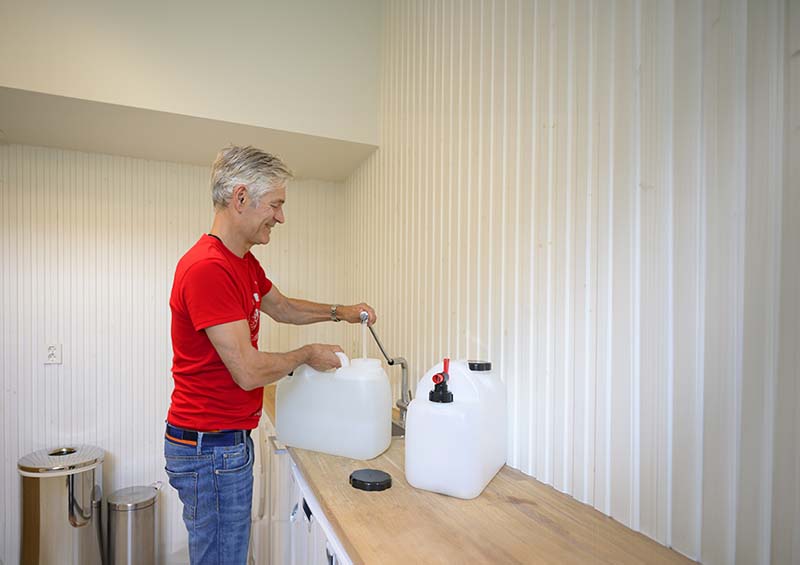
8. How Much Water Should You Drink Each Day?
The National Academy of Medicine traditionally advised that men should consume an adequate intake of daily fluids of about 13 cups and 9 cups for healthy women (with 8 ounces make up 1 cup).
However, current thinking among some health experts suggests a more frequent water intake throughout the day, regardless of thirst.
The actual amount of water needed varies from person to person. Various factors, including both internal body processes and external environmental conditions, influence your individual hydration needs.
Note: Listening to your body’s signals is key. Thirst is a reliable indicator that your body needs water. Adjust your water intake based on activity levels, climate, and overall health.
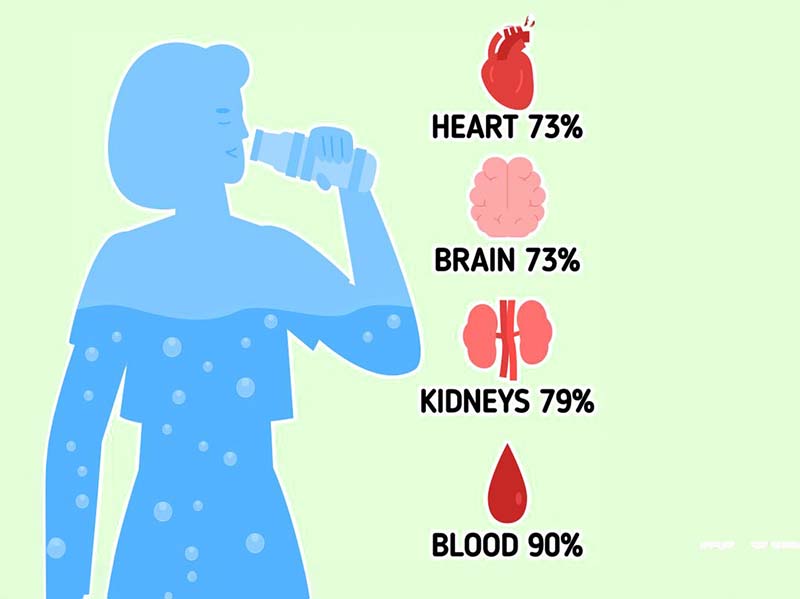
9. Conclusion
In conclusion, understanding the role of water in our diet is crucial, especially when considering the question, “Does water have calories?” As we’ve explored, water is a calorie-free necessity that plays a vital role in our overall health and well-being. Your individual water needs can vary based on numerous factors, but one fact remains constant: water is essential and calorie-free.
We’d love to hear your own experiences and insights on this topic. How has understanding the importance of water impacted your health journey? Share your stories and feedback in the comments below.
Don’t forget to explore more informative and engaging blogs from Biosculpture, where we continually dive into fascinating health and wellness topics. Your journey to better health is one we are excited to be a part of!


